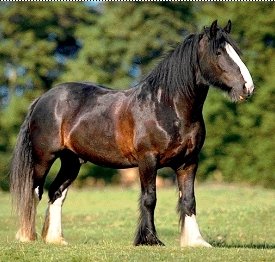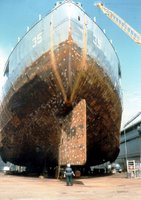Four Small Things
In James 3:1–8, we find four examples of small things that have a big effect. James gives three examples that correspond to the fourth, with which James deals in this chapter. All four seem relatively minor and insignificant, but they can have a tremendous effect, good or disastrous.
 In verse three, the example is a bit in a horse's mouth. "Behold, we put bits in the horses' mouths, that they may obey us; and we turn about their whole body." A horse is a huge animal. For example a Clydesdale can be up to six feet tall (not counting its head) and weigh between 1600 and 2400 pounds, or as much as a small car. That's a massive animal!
In verse three, the example is a bit in a horse's mouth. "Behold, we put bits in the horses' mouths, that they may obey us; and we turn about their whole body." A horse is a huge animal. For example a Clydesdale can be up to six feet tall (not counting its head) and weigh between 1600 and 2400 pounds, or as much as a small car. That's a massive animal!
But this huge animal is controlled, turned, or stopped by a small piece of metal in its mouth: a bit. Compared to the size of the horse, the bit is hardly worth noting; however, that little bit makes a big difference! A little bit of metal controls a huge and powerful horse.
 In verse four, the second example is the rudder on a ship. "Behold also the ships, which though they be so great, and are driven of fierce winds, yet are they turned about with a very small helm, whithersoever the governor listeth."
In verse four, the second example is the rudder on a ship. "Behold also the ships, which though they be so great, and are driven of fierce winds, yet are they turned about with a very small helm, whithersoever the governor listeth."
(This is a picture of the rudder of the USS Texas, a battleship from the first half of the twentieth century. This is an awfully big rudder, but the ship is 537 feet long!) A huge ship can be turned and guided by a relatively small piece of metal, the rudder. Compared to the size of the boat, the rudder is not that big, but it has a huge effect.
Now we might be tempted to think that these examples have to do with control: the bit controls the horse, and the rudder controls the ship, and so we should control our tongues. Indeed, James speaks of "bridling" one's entire body in verse two. However, he precludes the possibility of controlling our tongues in verses seven and eight: "For every kind of beasts, and of birds, and of serpents, and of things in the sea, is tamed, and hath been tamed of mankind: but the tongue can no man tame."
The "punch line" is found at the beginning of verse five: "Even so the tongue is a little member, and boasteth great things." Just like the bit is small but affects a huge animal, and just like the rudder is small in comparison to a big boat, so the tongue is small and seems insignificant, but it can have a huge effect.
 James has one more example: a raging fire. The second half of verse five says, "Behold, how great a matter a little fire kindleth!" Out west, massive forest fires destroy thousands of acres. Are these fires started by gigantic fireballs or flamethrowers or huge explosions? Rarely. Usually they begin from a discarded cigarette or a campfire that somebody forgot to put out. That little spark or burning fire seemed small, but it caused an enormous conflagration.
James has one more example: a raging fire. The second half of verse five says, "Behold, how great a matter a little fire kindleth!" Out west, massive forest fires destroy thousands of acres. Are these fires started by gigantic fireballs or flamethrowers or huge explosions? Rarely. Usually they begin from a discarded cigarette or a campfire that somebody forgot to put out. That little spark or burning fire seemed small, but it caused an enormous conflagration.
And, as James tells us in verse six, "The tongue is a fire, a world of iniquity." Our tongues and the words we say may seem insignificant, but they can have a huge effect. They can destroy people. They can feed the fires of jealousy, greed, and lust. We need to take our tongues seriously. They may be small, but they pack a big punch.
 In verse three, the example is a bit in a horse's mouth. "Behold, we put bits in the horses' mouths, that they may obey us; and we turn about their whole body." A horse is a huge animal. For example a Clydesdale can be up to six feet tall (not counting its head) and weigh between 1600 and 2400 pounds, or as much as a small car. That's a massive animal!
In verse three, the example is a bit in a horse's mouth. "Behold, we put bits in the horses' mouths, that they may obey us; and we turn about their whole body." A horse is a huge animal. For example a Clydesdale can be up to six feet tall (not counting its head) and weigh between 1600 and 2400 pounds, or as much as a small car. That's a massive animal!But this huge animal is controlled, turned, or stopped by a small piece of metal in its mouth: a bit. Compared to the size of the horse, the bit is hardly worth noting; however, that little bit makes a big difference! A little bit of metal controls a huge and powerful horse.
 In verse four, the second example is the rudder on a ship. "Behold also the ships, which though they be so great, and are driven of fierce winds, yet are they turned about with a very small helm, whithersoever the governor listeth."
In verse four, the second example is the rudder on a ship. "Behold also the ships, which though they be so great, and are driven of fierce winds, yet are they turned about with a very small helm, whithersoever the governor listeth."(This is a picture of the rudder of the USS Texas, a battleship from the first half of the twentieth century. This is an awfully big rudder, but the ship is 537 feet long!) A huge ship can be turned and guided by a relatively small piece of metal, the rudder. Compared to the size of the boat, the rudder is not that big, but it has a huge effect.
Now we might be tempted to think that these examples have to do with control: the bit controls the horse, and the rudder controls the ship, and so we should control our tongues. Indeed, James speaks of "bridling" one's entire body in verse two. However, he precludes the possibility of controlling our tongues in verses seven and eight: "For every kind of beasts, and of birds, and of serpents, and of things in the sea, is tamed, and hath been tamed of mankind: but the tongue can no man tame."
The "punch line" is found at the beginning of verse five: "Even so the tongue is a little member, and boasteth great things." Just like the bit is small but affects a huge animal, and just like the rudder is small in comparison to a big boat, so the tongue is small and seems insignificant, but it can have a huge effect.
 James has one more example: a raging fire. The second half of verse five says, "Behold, how great a matter a little fire kindleth!" Out west, massive forest fires destroy thousands of acres. Are these fires started by gigantic fireballs or flamethrowers or huge explosions? Rarely. Usually they begin from a discarded cigarette or a campfire that somebody forgot to put out. That little spark or burning fire seemed small, but it caused an enormous conflagration.
James has one more example: a raging fire. The second half of verse five says, "Behold, how great a matter a little fire kindleth!" Out west, massive forest fires destroy thousands of acres. Are these fires started by gigantic fireballs or flamethrowers or huge explosions? Rarely. Usually they begin from a discarded cigarette or a campfire that somebody forgot to put out. That little spark or burning fire seemed small, but it caused an enormous conflagration.And, as James tells us in verse six, "The tongue is a fire, a world of iniquity." Our tongues and the words we say may seem insignificant, but they can have a huge effect. They can destroy people. They can feed the fires of jealousy, greed, and lust. We need to take our tongues seriously. They may be small, but they pack a big punch.


0 Comments:
Post a Comment
<< Home